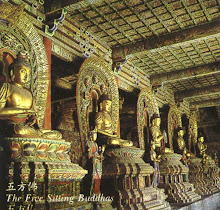(T1626.31)
Originally composed by Bodhisattva Sthiramati and translated into Chinese by Devapra~jnaa (T1626)
Translated into English by Charles Patton
________________________________________
I bow to the bodhicitta
And the ability to devise excellent skillful means.
Becoming free of the birth, old age, death,
Illness, and discomfort is based on the overcoming of error. (1)
Briefly speaking, bodhicitta [1] has twelve topics, and these are this present work's substance. Those of sharp wisdom should know as a sequence what is said to be its result, its cause, its self-nature, its distinct name, its being without distinction, its seperate positions, its being without taint, its everlastingness, its correspondence, the meaning of its inactive benefit, the meaning of its active benefit, and its singular nature. Among these, the very first demonstrates the bodhicitta's result, leading to seeing its excellent benefit. Next, then, is a discussion of the cause of its arising. And the very last section establishes this that produces the mark of its birth and demonstrates that it is distinctly named and yet without distinction. In all positions, it is devoid of the taint of clinging. It is a constant and pure Dharma, yet is concommittant. Within the impure position, there is no function of its merits, while in pure positions, it is able to actively bestow blessings. The singular nature should be known as Nirvana. Thus are the twelve topics. Now, in this work, these will be successively elaborated.
What is it that is called the result of the bodhicitta? It refers to that most tranquil realm of Nirvana (nirvana-dhaatu) [2]. This it is only the Buddhas who realize and no others are able to attain it. And why is that? Because it is only the Buddhas, the Tathaagatas, who are able to forever bring to cessaton all the minute and suble afflictions and passions [3]. Because in that there is no birth, forever unrepeated is the birth of mind or the birth of skandhas [4]. Because there is no old age, these merits are developed to the very most perfection, ultimate and without decline or change. Because there is no death, they forever depart inconceivably from change, transformation, and death. Because there is no illness, all the afflictions that are known as obstruction, illness, and habitual energy, these are forever ended. Because there is no discomfort, being based on the beginningless past, coming to the abiding place of ignorance (avidya) [5], and having habits, these are forever removed. Because there is no error, all the bodily, verbal, and mental mistakes and immoralities are not done.
Saturday, October 30, 2010
Subscribe to:
Comments (Atom)











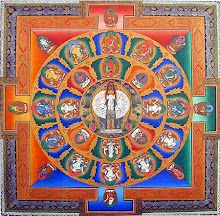




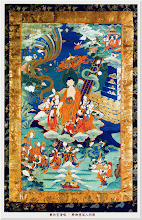

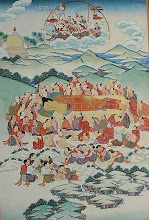


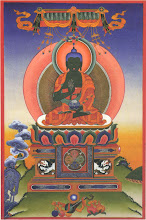




.jpg)

